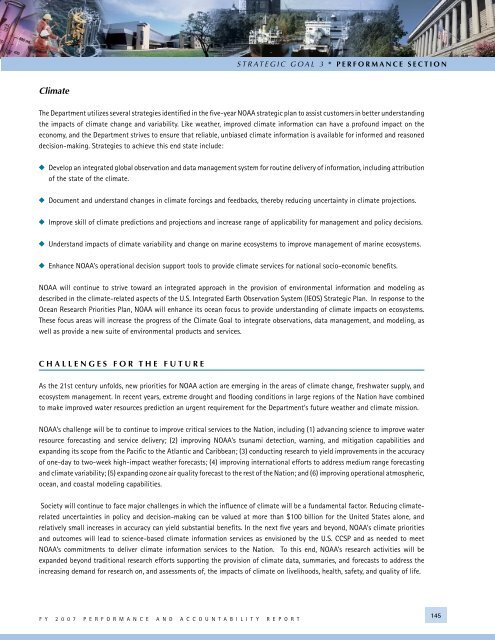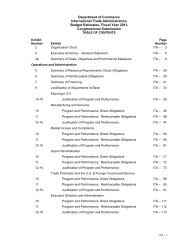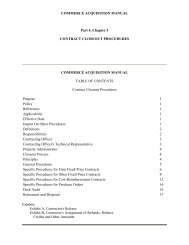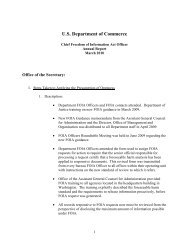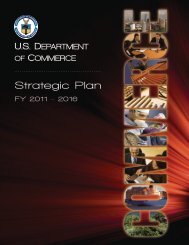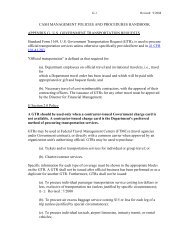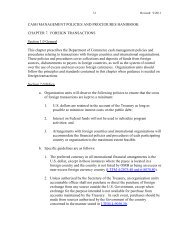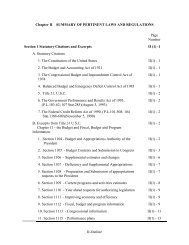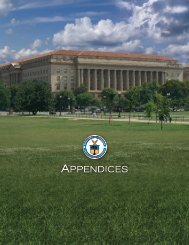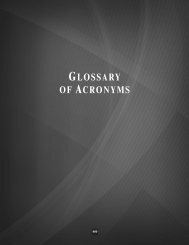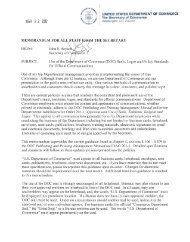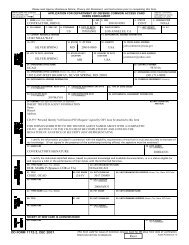- Page 1 and 2:
United States DEPARTMENT of Commerc
- Page 3 and 4:
U.S. Department of Commerce FY 2007
- Page 5 and 6:
A P P E N D I X A : P E R F O R M A
- Page 7 and 8:
A P P E N D I X A : P E R F O R M A
- Page 9 and 10:
A P P E N D I X A : P E R F O R M A
- Page 11 and 12:
M a n ag e m e n t D i s c u s s i
- Page 13 and 14:
Number of Targets Number of Targets
- Page 15 and 16:
A P P E N D I X A : P E R F O R M A
- Page 17 and 18:
A P P E N D I X A : P E R F O R M A
- Page 19 and 20:
A P P E N D I X A : P E R F O R M A
- Page 21 and 22:
A P P E N D I X A : P E R F O R M A
- Page 23 and 24:
A P P E N D I X A : P E R F O R M A
- Page 25 and 26:
A P P E N D I X A : P E R F O R M A
- Page 27 and 28:
A P P E N D I X A : P E R F O R M A
- Page 29 and 30:
1,653 892 A P P E N D I X A : P E R
- Page 31 and 32:
A P P E N D I X A : P E R F O R M A
- Page 33 and 34:
A P P E N D I X A : P E R F O R M A
- Page 35 and 36:
A P P E N D I X A : P E R F O R M A
- Page 37 and 38:
A P P E N D I X A : P E R F O R M A
- Page 39 and 40:
A P P E N D I X A : P E R F O R M A
- Page 41 and 42:
A P P E N D I X A : P E R F O R M A
- Page 43 and 44:
A P P E N D I X A : P E R F O R M A
- Page 45 and 46:
A P P E N D I X A : P E R F O R M A
- Page 47 and 48:
A P P E N D I X A : P E R F O R M A
- Page 49 and 50:
A P P E N D I X A : P E R F O R M A
- Page 51 and 52:
A P P E N D I X A : P E R F O R M A
- Page 53 and 54:
A P P E N D I X A : P E R F O R M A
- Page 55 and 56:
A P P E N D I X A : P E R F O R M A
- Page 57 and 58:
A P P E N D I X A : P E R F O R M A
- Page 59 and 60:
A P P E N D I X A : P E R F O R M A
- Page 61 and 62:
A P P E N D I X A : P E R F O R M A
- Page 63 and 64:
A P P E N D I X A : P E R F O R M A
- Page 65 and 66:
A P P E N D I X A : P E R F O R M A
- Page 67 and 68:
A P P E N D I X A : P E R F O R M A
- Page 69 and 70:
A P P E N D I X A : P E R F O R M A
- Page 71 and 72:
A P P E N D I X A : P E R F O R M A
- Page 73 and 74:
A P P E N D I X A : P E R F O R M A
- Page 75 and 76:
P e r f o r m a n c e S e c t i o n
- Page 77 and 78:
S t r at e g i c G oa l 1
- Page 79 and 80:
s t r a t e g i c g o a l 1 * P e r
- Page 81 and 82:
s t r a t e g i c g o a l 1 * P e r
- Page 83 and 84:
s t r a t e g i c g o a l 1 * P e r
- Page 85 and 86:
s t r a t e g i c g o a l 1 * P e r
- Page 87 and 88:
s t r a t e g i c g o a l 1 * P e r
- Page 89 and 90:
s t r a t e g i c g o a l 1 * P e r
- Page 91 and 92:
s t r a t e g i c g o a l 1 * P e r
- Page 93 and 94:
s t r a t e g i c g o a l 1 * P e r
- Page 95 and 96:
s t r a t e g i c g o a l 1 * P e r
- Page 97 and 98:
s t r a t e g i c g o a l 1 * P e r
- Page 99 and 100:
s t r a t e g i c g o a l 1 * P e r
- Page 101 and 102:
s t r a t e g i c g o a l 1 * P e r
- Page 103 and 104: s t r a t e g i c g o a l 1 * P e r
- Page 105 and 106: s t r a t e g i c g o a l 1 * P e r
- Page 107 and 108: s t r a t e g i c g o a l 1 * P e r
- Page 109 and 110: s t r a t e g i c g o a l 1 * P e r
- Page 111 and 112: S t r at e g i c G oa l 2
- Page 113 and 114: s t r a t e g i c g o a l 2 * P e r
- Page 115 and 116: s t r a t e g i c g o a l 2 * P e r
- Page 117 and 118: s t r a t e g i c g o a l 2 * P e r
- Page 119 and 120: s t r a t e g i c g o a l 2 * P e r
- Page 121 and 122: s t r a t e g i c g o a l 2 * P e r
- Page 123 and 124: s t r a t e g i c g o a l 2 * P e r
- Page 125 and 126: s t r a t e g i c g o a l 2 * P e r
- Page 127 and 128: s t r a t e g i c g o a l 2 * P e r
- Page 129 and 130: s t r a t e g i c g o a l 2 * P e r
- Page 131 and 132: s t r a t e g i c g o a l 2 * P e r
- Page 133 and 134: s t r a t e g i c g o a l 2 * P e r
- Page 135 and 136: s t r a t e g i c g o a l 2 * P e r
- Page 137 and 138: s t r a t e g i c g o a l 2 * P e r
- Page 139 and 140: S t r at e g i c G oa l 3
- Page 141 and 142: s t r a t e g i c g o a l 3 * P e r
- Page 143 and 144: s t r a t e g i c g o a l 3 * P e r
- Page 145 and 146: s t r a t e g i c g o a l 3 * P e r
- Page 147 and 148: s t r a t e g i c g o a l 3 * P e r
- Page 149 and 150: s t r a t e g i c g o a l 3 * P e r
- Page 151 and 152: s t r a t e g i c g o a l 3 * P e r
- Page 153: s t r a t e g i c g o a l 3 * P e r
- Page 157 and 158: s t r a t e g i c g o a l 3 * P e r
- Page 159 and 160: s t r a t e g i c g o a l 3 * P e r
- Page 161 and 162: s t r a t e g i c g o a l 3 * P e r
- Page 163 and 164: s t r a t e g i c g o a l 3 * P e r
- Page 165 and 166: s t r a t e g i c g o a l 3 * P e r
- Page 167 and 168: s t r a t e g i c g o a l 3 * P e r
- Page 169 and 170: s t r a t e g i c g o a l 3 * P e r
- Page 171 and 172: s t r a t e g i c g o a l 3 * P e r
- Page 173 and 174: M a n ag e m e n t I n t e g r at i
- Page 175 and 176: M Aa Nn Aa Gg Ee Mm Ee Nn T t I Nn
- Page 177 and 178: M Aa Nn Aa Gg Ee Mm Ee Nn T t I Nn
- Page 179 and 180: M Aa Nn Aa Gg Ee Mm Ee Nn T t I Nn
- Page 181 and 182: M A N A G E M E N T I N T E G R A T
- Page 183 and 184: F i n a n c i a l S e c t i o n
- Page 185: F i n a n c i a l M a n ag e m e n
- Page 188 and 189: F i n a n c i a l M a n a g e m e n
- Page 190 and 191: F i n a n c i a l M a n a g e m e n
- Page 192 and 193: F i n a n c i a l M a n a g e m e n
- Page 194 and 195: F i n a n c i a l M a n a g e m e n
- Page 196 and 197: F i n a n c i a l M a n a g e m e n
- Page 198 and 199: F i n a n c i a l M a n a g e m e n
- Page 200 and 201: F i n a n c i a l M a n a g e m e n
- Page 203 and 204: P R I N C I P A L F I N A N C I A L
- Page 205 and 206:
P R I N C I P A L F I N A N C I A L
- Page 207 and 208:
Notes to the Financial Statements (
- Page 209 and 210:
N O T E S T O T H E F I N A N C I A
- Page 211 and 212:
N O T E S T O T H E F I N A N C I A
- Page 213 and 214:
N O T E S T O T H E F I N A N C I A
- Page 215 and 216:
N O T E S T O T H E F I N A N C I A
- Page 217 and 218:
N O T E S T O T H E F I N A N C I A
- Page 219 and 220:
N O T E S T O T H E F I N A N C I A
- Page 221 and 222:
N O T E S T O T H E F I N A N C I A
- Page 223 and 224:
N O T E S T O T H E F I N A N C I A
- Page 225 and 226:
N O T E S T O T H E F I N A N C I A
- Page 227 and 228:
N O T E S T O T H E F I N A N C I A
- Page 229 and 230:
N O T E S T O T H E F I N A N C I A
- Page 231 and 232:
N O T E S T O T H E F I N A N C I A
- Page 233 and 234:
N O T E S T O T H E F I N A N C I A
- Page 235 and 236:
N O T E S T O T H E F I N A N C I A
- Page 237 and 238:
N O T E S T O T H E F I N A N C I A
- Page 239 and 240:
N O T E S T O T H E F I N A N C I A
- Page 241 and 242:
N O T E S T O T H E F I N A N C I A
- Page 243 and 244:
N O T E S T O T H E F I N A N C I A
- Page 245 and 246:
N O T E S T O T H E F I N A N C I A
- Page 247 and 248:
N O T E S T O T H E F I N A N C I A
- Page 249 and 250:
N O T E S T O T H E F I N A N C I A
- Page 251 and 252:
N O T E S T O T H E F I N A N C I A
- Page 253 and 254:
N O T E S T O T H E F I N A N C I A
- Page 255 and 256:
N O T E S T O T H E F I N A N C I A
- Page 257 and 258:
N O T E S T O T H E F I N A N C I A
- Page 259 and 260:
N O T E S T O T H E F I N A N C I A
- Page 261:
Consolidating Balance Sheet
- Page 264 and 265:
C O N S O L I D A T I N G B A L A N
- Page 267 and 268:
R e q u i r e d s u p p l e m e n t
- Page 269 and 270:
R e q u i r e d s u p p l e m e n t
- Page 271:
R e q u i r e d S u p p l e m e n t
- Page 274 and 275:
R E Q U I R E D S U P P L E M E N T
- Page 276 and 277:
R E Q U I R E D S U P P L E M E N T
- Page 278 and 279:
R E Q U I R E D S U P P L E M E N T
- Page 280 and 281:
R E Q U I R E D S U P P L E M E N T
- Page 282 and 283:
R E Q U I R E D S U P P L E M E N T
- Page 285 and 286:
I n d e p e n d e n t A u d i t o r
- Page 287 and 288:
I n d e p e n d e n t A u d i t o r
- Page 289 and 290:
I n d e p e n d e n t A u d i t o r
- Page 291 and 292:
I n d e p e n d e n t A u d i t o r
- Page 293 and 294:
I n d e p e n d e n t A u d i t o r
- Page 295 and 296:
I n d e p e n d e n t A u d i t o r
- Page 297 and 298:
I n d e p e n d e n t A u d i t o r
- Page 299:
A p p e n d i c e s
- Page 302 and 303:
A P P E N D I X A : P E R F O R M A
- Page 304 and 305:
A P P E N D I X A : P E R F O R M A
- Page 306 and 307:
A P P E N D I X A : P E R F O R M A
- Page 308 and 309:
A P P E N D I X A : P E R F O R M A
- Page 310 and 311:
A P P E N D I X A : P E R F O R M A
- Page 312 and 313:
A P P E N D I X A : P E R F O R M A
- Page 314 and 315:
A P P E N D I X A : P E R F O R M A
- Page 316 and 317:
A P P E N D I X A : P E R F O R M A
- Page 318 and 319:
A P P E N D I X A : P E R F O R M A
- Page 320 and 321:
A P P E N D I X A : P E R F O R M A
- Page 322 and 323:
A P P E N D I X A : P E R F O R M A
- Page 324 and 325:
A P P E N D I X A : P E R F O R M A
- Page 326 and 327:
A P P E N D I X A : P E R F O R M A
- Page 328 and 329:
A P P E N D I X A : P E R F O R M A
- Page 330 and 331:
A P P E N D I X A : P E R F O R M A
- Page 332 and 333:
A P P E N D I X A : P E R F O R M A
- Page 334 and 335:
A P P E N D I X A : P E R F O R M A
- Page 336 and 337:
A P P E N D I X A : P E R F O R M A
- Page 338 and 339:
A P P E N D I X A : P E R F O R M A
- Page 340 and 341:
A P P E N D I X A : P E R F O R M A
- Page 342 and 343:
A P P E N D I X A : P E R F O R M A
- Page 344 and 345:
A P P E N D I X A : P E R F O R M A
- Page 346 and 347:
A P P E N D I X A : P E R F O R M A
- Page 348 and 349:
A P P E N D I X A : P E R F O R M A
- Page 350 and 351:
A P P E N D I X A : P E R F O R M A
- Page 352 and 353:
A P P E N D I X A : P E R F O R M A
- Page 354 and 355:
A P P E N D I X A : P E R F O R M A
- Page 356 and 357:
A P P E N D I X A : P E R F O R M A
- Page 358 and 359:
APPENDIX B: Discontinued or Changed
- Page 360 and 361:
APPENDIX B: Discontinued or Changed
- Page 362 and 363:
APPENDIX B: Discontinued or Changed
- Page 364 and 365:
APPENDIX B: Discontinued or Changed
- Page 366 and 367:
A P P E N D I x C : P e r f o r m a
- Page 368 and 369:
A P P E N D I x C : P e r f o r m a
- Page 370 and 371:
A P P E N D I x C : P e r f o r m a
- Page 372 and 373:
A P P E N D I x C : P e r f o r m a
- Page 374 and 375:
A P P E N D I x C : P e r f o r m a
- Page 376 and 377:
A P P E N D I x C : P e r f o r m a
- Page 378 and 379:
A P P E N D I x C : P e r f o r m a
- Page 380 and 381:
A P P E N D I x C : P e r f o r m a
- Page 382 and 383:
A P P E N D I x C : P e r f o r m a
- Page 384 and 385:
A P P E N D I x C : P e r f o r m a
- Page 386 and 387:
A P P E N D I x C : P e r f o r m a
- Page 388 and 389:
A P P E N D I x C : P e r f o r m a
- Page 390 and 391:
A P P E N D I x C : P e r f o r m a
- Page 392 and 393:
A P P E N D I x C : P e r f o r m a
- Page 394 and 395:
A P P E N D I x C : P e r f o r m a
- Page 396 and 397:
A P P E N D I x C : P e r f o r m a
- Page 398 and 399:
A P P E N D I x C : P e r f o r m a
- Page 400 and 401:
A P P E N D I x C : P e r f o r m a
- Page 402 and 403:
A P P E N D I x C : P e r f o r m a
- Page 404 and 405:
A P P E N D I x C : P e r f o r m a
- Page 406 and 407:
A P P E N D I x C : P e r f o r m a
- Page 408 and 409:
A P P E N D I x C : P e r f o r m a
- Page 410 and 411:
A P P E N D I x C : P e r f o r m a
- Page 412 and 413:
A P P E N D I x C : P e r f o r m a
- Page 414 and 415:
A P P E N D I x C : P e r f o r m a
- Page 416 and 417:
A P P E N D I x D : I m p r o p e r
- Page 418 and 419:
A P P E N D I x E : S u m m a r y o
- Page 420 and 421:
A P P E N D I X F : G L O S S A R Y
- Page 422 and 423:
A P P E N D I X F : G L O S S A R Y
- Page 424:
D E PA R T M E N T O F C O M M E R


